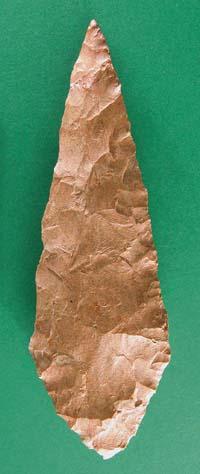The instruments of the Stone Age, more sophisticated than expected
2011/01/01 Elhuyar Zientzia Iturria: Elhuyar aldizkaria

In the cave of Blombos, in the South African Republic, there are indications that our prehistoric ancestors used a sophisticated technique to work the stones. The discovery was made by a team of researchers from the University of Toulouse, according to which the activity we call pressure cut extended to 75,000 years, about 55,000 years earlier than expected.
Pressurized cutting allows the edges of stone tools to be worked carefully. The technique is based on the removal of small pieces of stone by pressure on the edge of the stone tool with a useful bone.
In Blombos have been found 127 triangular rock tips of 75,000 years ago, probably used for the formation of penknives or spears, all of them of sycrete (cemented conglomerate with silica). To clarify whether pressure carving was actually used, the researchers collected other samples of silcrete around the cave, creating replicas of the instruments found in the subsoil. For this purpose two techniques were used: one of staggering and the other based on the pressurized carving of the final touches after the hammering. When comparing the replicas with the old stone openings, it was observed that the three-fifths of the old openings had pressure-cut signals with softer and more defined edges.
Until now, scientists considered that this technique was first used 20,000 years ago. In France there appeared the traces that proved it.

Gai honi buruzko eduki gehiago
Elhuyarrek garatutako teknologia






